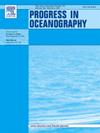赤道、开尔文、罗斯比和柳井光束的解析解
IF 3.8
3区 地球科学
Q1 OCEANOGRAPHY
引用次数: 0
摘要
众所周知,风驱动的赤道开尔文波、罗斯比波和柳井波可以垂直传播,也可以分区传播,它们的波包可以形成 "波束",沿着符合波群理论的射线路径下降到深海。在这里,我们得到了一个简化海洋模型的解析解,与之前的研究相比,它对波束的特性和动力学提供了更完整的描述。该模型是一个线性、连续分层(LCS)系统,其中底部被忽略,背景维萨拉频率 Nb 为常数。求解受到振荡风应力的影响,即 τα=τoαXxexp-iσt ,其中:α 为 x 或 y;Xx 局限于 -L<x<L 区域,单调增减;τα 以 Zz=2/πh/z2+h2 的体力形式进入海洋。在这些限制条件下,解可以用 z 的余弦变换来表示,并且可以很容易地反转。所有三种波的波束解都具有相似的数学形式,因此有许多共同的特性。这三种波型的波束解都具有相似的数学形式,因此具有许多共同特性。除其他外,这些解显示了波束的结构和振幅如何取决于上述模型参数。此外,还指出了解法中忽略的过程的潜在影响。本文章由计算机程序翻译,如有差异,请以英文原文为准。
Analytic solutions for equatorial, Kelvin, Rossby, and Yanai beams
Wind-driven equatorial Kelvin, Rossby, and Yanai waves are known to propagate vertically, as well as zonally, and packets of them can form “beams” that descend into the deep ocean along ray paths consistent with wave-group theory. Here, we obtain analytic solutions to a simplified ocean model that provide a more complete description of beam properties and dynamics than in previous studies.
The model is a linear, continuously stratified (LCS) system, in which the bottom is ignored and the background Vaisala frequency is constant. Solutions are forced by an oscillatory wind stress, , where: is or ; is confined to the region and increases and decreases monotonically; and enters the ocean as a body force with the profile . Under these restrictions, solutions can be represented as cosine transforms in that can be readily inverted.
Beam solutions for all three wave types have similar mathematical forms, and hence share many properties. Among other things, the solutions show how the structure and amplitude of beams depend on the above model parameters. Potential impacts of processes neglected in the solutions are noted.
求助全文
通过发布文献求助,成功后即可免费获取论文全文。
去求助
来源期刊

Progress in Oceanography
地学-海洋学
CiteScore
7.20
自引率
4.90%
发文量
138
审稿时长
3 months
期刊介绍:
Progress in Oceanography publishes the longer, more comprehensive papers that most oceanographers feel are necessary, on occasion, to do justice to their work. Contributions are generally either a review of an aspect of oceanography or a treatise on an expanding oceanographic subject. The articles cover the entire spectrum of disciplines within the science of oceanography. Occasionally volumes are devoted to collections of papers and conference proceedings of exceptional interest. Essential reading for all oceanographers.
 求助内容:
求助内容: 应助结果提醒方式:
应助结果提醒方式:


